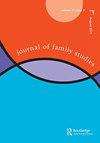轮流:瑞典女同性恋夫妇决定(第一)生母
IF 1.6
4区 社会学
Q3 FAMILY STUDIES
引用次数: 0
摘要
这篇文章分析了瑞典的女同性恋伴侣如何在平等被认为是通过做同样的事情来实现的背景下协商生育母亲[Gullestad, M.(2002)]。看不见的栅栏:平等主义、民族主义和种族主义。皇家人类学研究所学报,8(1),45-63。https://doi.org/10.1111/1467 - 9655.00098)。我们通过研究20对夫妇如何决定谁将成为(第一个)生母的叙述来做到这一点,这是一小群父母所特有的决定,对母性规范、亲属关系和夫妻内部决策的理论影响超出了夫妇本身。大多数受访夫妇计划生两个孩子,轮流生育,这一计划在一定程度上解决了平等和同一性的挑战。基因联系被淡化了,相反,怀孕的具体化和经常渴望的经历被强调了。在决定谁将成为(第一个)生母时,夫妇们的推理集中在年龄和欲望上,这两个因素都被认为是无害的、“自然的”决定因素,化解了一个潜在的破坏性决定。本文章由计算机程序翻译,如有差异,请以英文原文为准。
Taking turns: lesbian couples’ decision of (first) birth mother in Sweden
ABSTRACT This article presents an analysis of how lesbian couples in Sweden negotiate birth motherhood in a context where equality is thought to be achieved by being and doing the same [Gullestad, M. (2002). Invisible fences: Egalitarianism, nationalism and racism. Journal of the Royal Anthropological Institute, 8(1), 45–63. https://doi.org/10.1111/1467-9655.00098]. We do so by studying narratives of how 20 couples arrived at the decision of who will be the (first) birth mother, a decision unique to a small group of parents with theoretical implications for motherhood norms, kinship and within-couple decision-making extending beyond the couples themselves. Most couples interviewed planned to have two children and take turns carrying, a plan that to some extent solves the challenge of equality and sameness. Genetic links were downplayed and instead, the embodied and often desired experience of pregnancy was foregrounded. In deciding who would be the (first) birth mother, the couples’ reasoning centred on age and desire, both presented as harmless and ‘natural’ determinants that defused a potentially disruptive decision.
求助全文
通过发布文献求助,成功后即可免费获取论文全文。
去求助
来源期刊

Journal of Family Studies
FAMILY STUDIES-
CiteScore
3.20
自引率
12.50%
发文量
52
期刊介绍:
The Journal of Family Studies is a peer reviewed international journal under the Editorship of Adjunct Professor Lawrie Moloney, School of Public Health, LaTrobe University; Australian Institute of Family Studies; and co-director of Children in Focus. The focus of the Journal of Family Studies is on the wellbeing of children in families in the process of change.
 求助内容:
求助内容: 应助结果提醒方式:
应助结果提醒方式:


